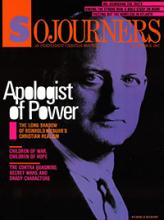Reinhold Niebuhr (1902-1971) was one of the most influential political and religious thinkers in the United States in this century. His influence spread just as widely in political circles as in religious ones through his work as a leftist pastor and activist in the '20s; a professor at New York City's Union Theological Seminary; an author of many articles and books, including Moral Man and Immoral Society (1932); the founder in 1940 of the liberal Protestant journal Christianity and Crisis; and as an adviser to policy-makers during the creation of the post-World War II international political system. Niebuhr's "Christian realism" provided a religious justification and framework for the Cold War foreign policy of the United States, a policy that emphasized "containment" of the Soviet Union and utilized the tactic of intervention in the Third World when necessary.
Not long ago, we asked Sojourners contributing editor and United Methodist pastor Bill Kellermann to review two recent significant books on Niebuhr: Reinhold Niebuhr, by Richard Wightman Fox (Pantheon Books, New York, 1986), and The Essential Reinhold Niebuhr, edited by Robert McAfee Brown (Yale University Press, New Haven, 1986). That review quickly - and appropriately, in our view - grew into a feature-length treatment and critique of Niebuhr and his influence on U.S. Christians and policymakers. -- The Editors
Reinhold Niebuhr is a hot topic these days. A major religious publishing house turned down the manuscript of Richard Fox's definitive new biography on the "father of Christian realism," (Reinhold Niebuhr) because its editors thought that no one would be interested. "Boy," said one of the editors recently, "were we wrong."
Read the Full Article

